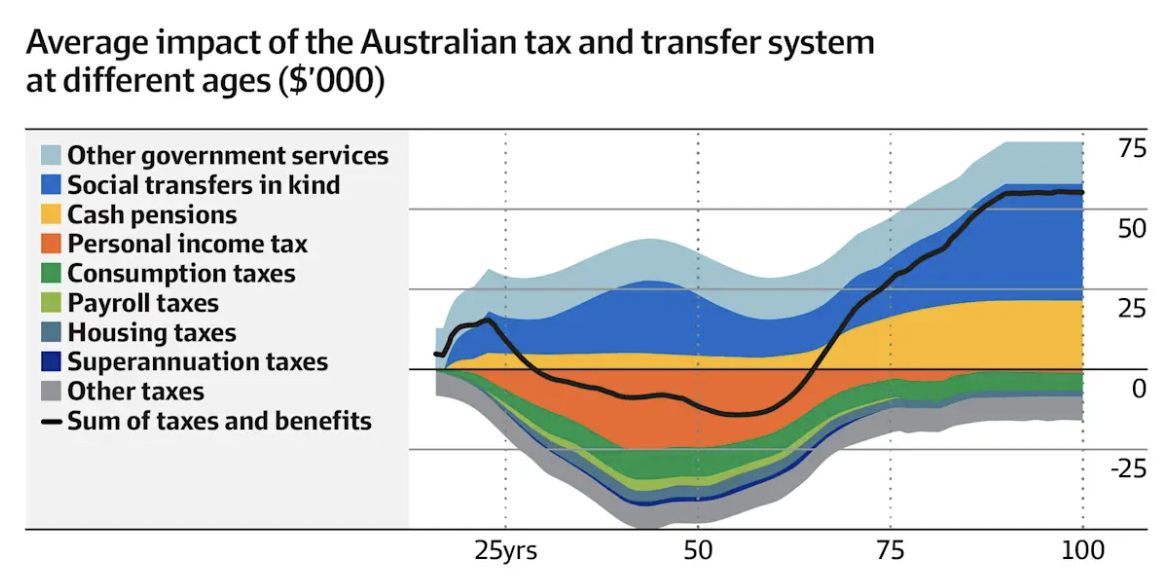Retirees earn more than young workers, no wonder productivity is dead
Jim Chalmer's much-publicised productivity summit has come and gone and, in what will come as a surprise to no one, has reportedly achieved little in the way of consensus.
The variously self-interested parties in attendance predictably agreed on some things, disagreed on others, and most seem to have come away believing that it's still their solutions to the country's biggest economic ills that remain the righteous path forward.
But there's one thing that's not uncertain and needs to be addressed if Australia is going to have any chance at prosperity in future.
According to research from Robert Breunig and the ANU, older Australians now earn a higher average income than young working Australians, once you factor in tax and include capital gains.
Those aged 75-and-over now earn a post-tax and transfer income of more than $100,000.
That's 1.3x higher than the average 18 to 30-year-old.
Stop and think about that for a second, and the insanity becomes apparent.
But it wasn't always like this.
25 years ago, according to ANU's research, the average 75-year-old post-tax and transfer income was only 75% of the average income.
These days it's equal to the average income.

It doesn't get better when we broaden the age cohorts.
The average 60+ Australian earns a similar post-tax income to the average 40-year-old, i.e. someone in the prime of their career and likely at peak earning potential.
Whatever way you want to spin it, this is objectively terrible for an economy that is already struggling with anaemic growth and poor productivity.
We're a country that overtaxes hard work that actually contributes to the economy and rewards those hoarding unproductive assets while contributing little back.
Older Australians have much lower expenses and inject much less of their money into the economy.
Younger people drive economic activity and the growth that comes with it.
Outright homeowners (read: older people) have an annual average disposable income 86% higher than renters (younger people), once you include housing income, according to data from Household, Income and Labour Dynamics in Australia (HILDA).
Nipping the likely objections in the bud
I'm not the first person to make this argument, and the likely counterpoints are fairly predictable:
- Not all older Australians are wealthy - This is a fair point and also worthy of attention. Wealth inequality exists within generations and economic policy should look at helping out those left behind, regardless of their age.
- I worked hard for my wealth and paid tax all my life - No one is disputing this. But you must also recognise that you benefited from the greatest period of prosperity in human history, as well as years of favourable tax incentives and policy designed to give you a further leg up.
- I'd be stupid not to take advantage of tax breaks that are available to me - This is rational, but again there needs to be an acknowledgement that tax is part of a larger budgetary zero-sum game. Tax breaks given to one group mean other groups go without.
- It's unfair for the government to change the rules - By this argument, it was unfair for the government to introduce the rules favouring older, asset-rich Australians in the first place.
Of course, this isn't necessarily a moral judgement of older Australians who are benefiting from the current arrangement.
The extreme value appreciation in both the property and stock markets is the biggest reason for this wealth and income disparity, and both are firmly out of the control of everyday older Australians.
There are also various incentives that both encourage older Australians to hold onto their properties (means-tested pensions) and arguably punish them for selling (stamp duty).
Throw in a dividend-heavy stock market, capital gains tax discounts, franking credits and more, and it's clear the deck has been shuffled more in the favour of older Australians than any other generation before or since.
John Howard's battlers aren't battling anymore.
Instead, we have a generation of Smaugs - hoarding assets and contributing very little back to the economy.
In contrast, young Australians are disadvantaged at every step.
Faced with an impossible-to-afford housing market, increased job insecurity (including the threat of AI) and shrinking real wages, young Australians are barely able to keep their heads above water financially, let alone start growing their wealth in the same way as previous generations.
If Australia were a casino, they'd be well within their rights to walk straight out the door under the well-founded assumption that the game is deliberately rigged against them.
It's generational feudalism.

So how do we solve this?
The first step is for everyone to openly acknowledge that this is a clear and serious issue.
It seems like the tide may be turning on that point.
Treasurer Jim Chalmers admitted to the National Press Club that “no sensible progress can be made on productivity, resilience or budget sustainability without proper consideration of more tax reform."
In terms of the policy changes that need to occur, that deserves its own article.
We should be realistically considering all of the following: land tax in place of stamp duty, wealth tax, a complete paring back of negative gearing and franking credits, changes to pension means testing, and lower income and business tax.
4 topics

